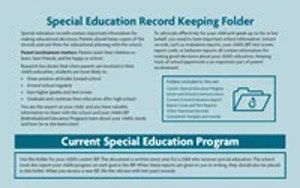
How to Learn the Surrogate Parent Role
Here are a few simple guidelines to obtain needed information to plan effectively for the child. If you do not know the child you have been appointed to represent, you may need to take some time learning about the child and his or her educational history.
Learn about the Child
There are many ways to gather information that will support your effectiveness in advocating for a child in the special education process. It may be helpful for the surrogate parent to:
- Meet the child. If the child is young or has a cognitive impairment, present yourself as a friend since the term “surrogate parent” may be confusing to the child.
- Visit the child’s home to see them in their home environment, if possible.
- Visit the child’s school to observe them in the classroom and talk with their teachers. Follow school procedures to make an appointment for the observation.
- Review the child’s school and special education records. Ask the school to make copies of these records for you.
- If the child has county case management services, talk with the child’s county case manager about his or her educational history.
- Make certain that teachers, therapists, supervisors, and other professionals involved with the child know that you are acting as the child’s surrogate parent.
- Fill out a Student Profile Sheet on the child.
- Keep a record and file of all written and verbal contact you have with the school.
- Ask questions about anything you do not understand.
Questions can be the surrogate parent's most powerful tool in learning about the child. The following questions can help the surrogate parent better understand the child’s unique needs.
How does the child learn?
- By watching?
- By hearing?
- In a group? Alone?
- Does the child use assistive technology?
What does the child like or dislike about school?
- What is the child's favorite part of the school day? Favorite academic subject? Least favorite subject?
- Does the child have friends at school?
- What are the child's general feelings about school?
What are the child's strengths or special skills? What are the child's special interests or hobbies?
- What does the child enjoy doing?
- Does the child like to play games alone or with others?
- Does the child like group sports?
What are the child's attitudes about and relationships with other people?
- With close adults such as foster parents? Relatives? Other adults?
- With other children? Peers?
- Does the child play alone? With adults? With other children?
- Which school staff does the child get along best with?
What rewards motivate the child?
- Verbal praise?
- Material things, such as food or toys?
What discourages or turns off the child?
- Being singled out publicly?
- Certain sensory environments, such as noisy classrooms or crowded hallways?
- Is the child afraid of anything? If so, what?
What kind of living skills and adaptive behavior does the child exhibit?
- Independent or dependent upon adults?
- Age-appropriate everyday functioning?
What is the child's developmental history?
- Age of walking? Age of talking?
- Does the child compensate for the disability? When did this begin? For example, at what age did a child who is deaf begin using sign language? When did the child with a physical disability begin using a wheelchair?
What is the child's medical history?
- Is there a history of medical problems affecting education?
- Is the child currently taking any medication?
- What medications have not worked in the past?
Learn about the Disability
The surrogate parent will also need to learn about the child's disability or disabilities. You can find many organizations at the local, state, and national level that provide disability-specific information and services to individuals and families. PACER Center updates a resource list of disability organizations annually.
Keeping Confidentiality
Surrogate parents have access to the child's school records that will contain confidential information. They also will receive confidential information while talking with teachers and county social workers. It is required to use this information with care and discretion and respect the privacy of the child.
Resources
Student Profile Sheet
This resource from PACER Center is designed to help the surrogate parent gather information about the child you are representing in the special education process. Available for download at no cost.
Record Keeping Supports Parent Participation in Special Education Planning
Developing an organizational system for the records of the child you represent is an effective way for surrogate parents to prepare for Individualized Education Program (IEP) team meetings. PACER Center has compiled this list of categories to consider for the record-keeping system you develop, to help you track the child’s educational progress and changing educational needs as they grow and develop through the school years. Available for download at no cost.

Special Education Record Keeping Folder
This plastic accordion file from PACER Center is a valuable tool to assist surrogate parents in organizing school and special education records. Six tabbed folders are included, with tips to help you keep track of the information you gather about a child’s evaluation data, current special education program, communication with home and school, educational progress, schoolwork samples, and more. Call 952-838-9000 to purchase. Cost is $10 for a single folder or $8 per folder for an order of more than 10.
